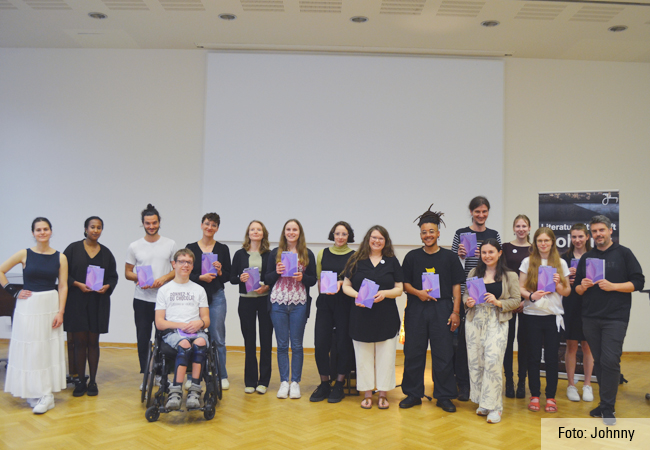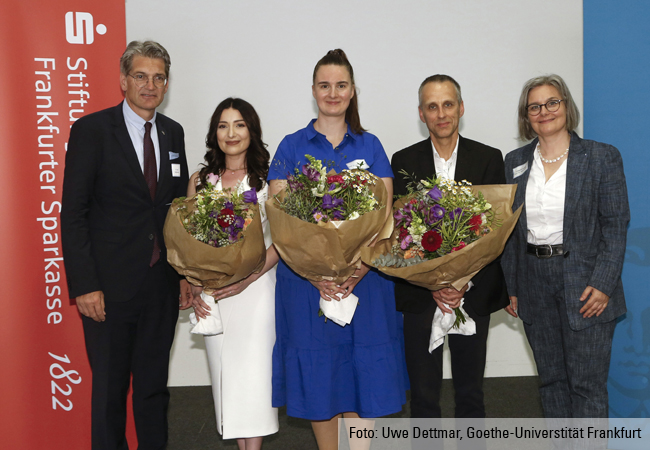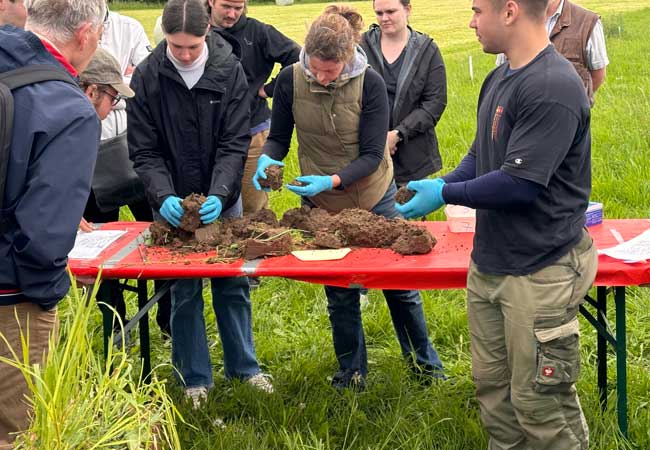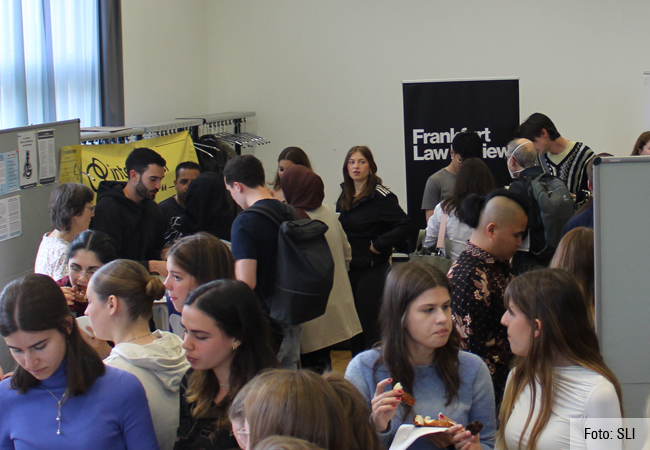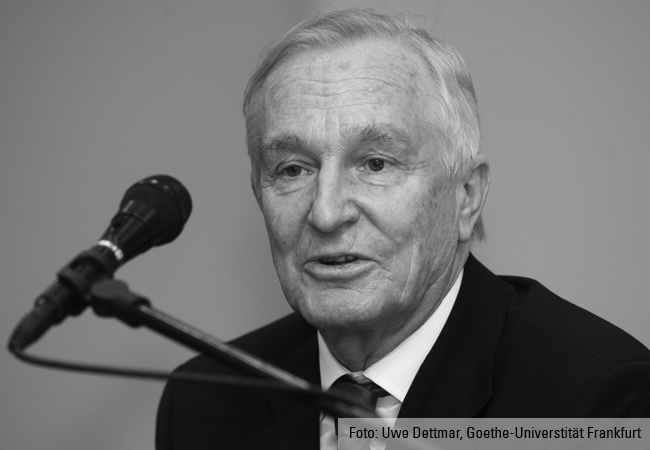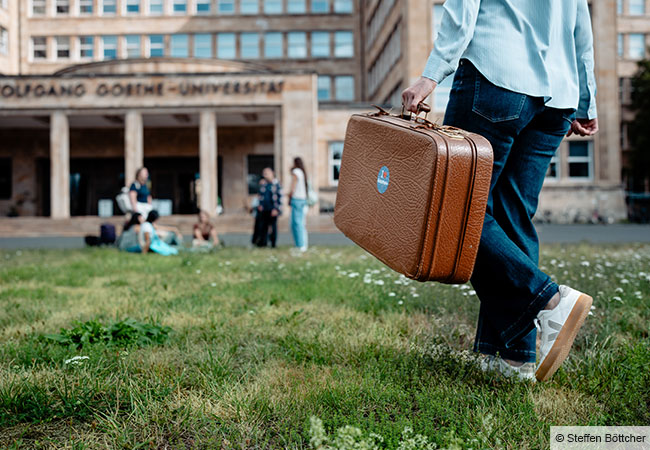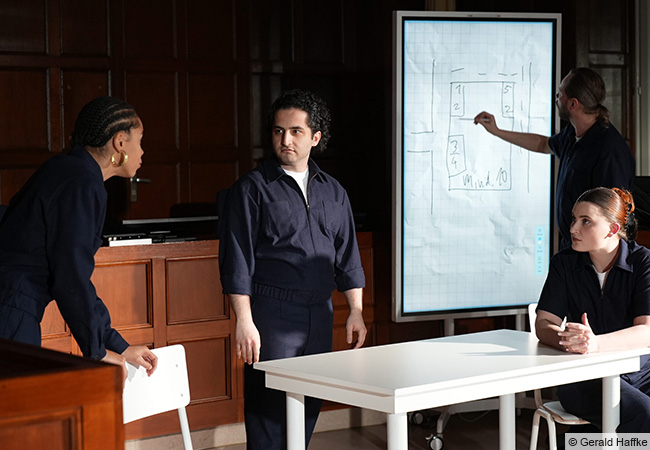In the Language Café, students encounter many different languages.
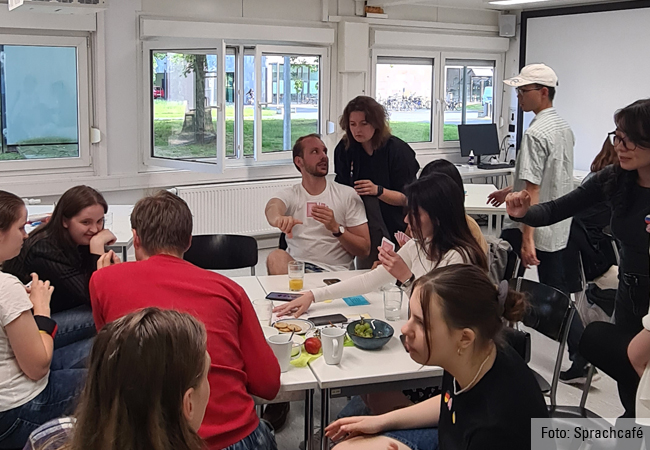
When you enter the Language Center on an afternoon when it is “open”, the slogan of the 2006 FIFA World Cup in Germany, “A Time to Make Friends”, comes to mind: Around 70 students are gathered around tables in seminar rooms or standing outside in small groups, chatting animatedly, enjoying drinks and snacks and clearly having a lot of fun. But the most important thing about this “motley crew” is not visible but audible: Everyone is happily conversing in a wide variety of languages.
While you are still endeavoring to identify whether the people at the table next to the window are speaking Japanese or Korean, a new participant enters the room and hollers: “Hola chicos!” (“Hi, everybody!”). He has evidently taken part in the Language Café several times before because he goes straight to the drinks counter, stocks up and then immediately joins the Spanish group, which has set up a board game and spread cards out on one of the tables. Another group stands in front of the large selection of games, which are available in a wide variety of languages, and finally decides on “Dammi una A!” (“Give me an A!”). There are also colorful little flashcards in 16 different languages to help start a conversation. For example, you can hear a group talking in Turkish about “izledi˘gim bir film …” (“the last movie I saw …”), while right next to them someone is telling “uma história engraçada …” (“a funny story …”) in Portuguese.
Before they start, the students are met by the Language Center’s student assistants, who distribute stickers indicating which languages the participants have chosen to practice on that day. In this way, everyone knows straight away who understands, speaks and wants to practice which languages. On occasion, the impressive collection of stickers on some people’s T-shirts is hard to miss, even from a distance.
Just start talking!
The Language Café took place for the first time in the 2023 summer semester, and has become increasingly popular since. Evelyn Guzmán Jiménez works at the Language Center and is responsible for the project. She explains: “We want to create opportunities and space for language exchange, on the one hand to train oral language skills and on the other hand to make the diversity and multilingualism on our campus visible and experienceable.” The informal setting ensures that students quickly lose their inhibitions and often “just start talking”, unlike in a language course where everyone is solely intent on not making a mistake. This “relaxed” atmosphere is one of the Language Café’s big advantages, remarks Beatrice, an Erasmus student from Venice who is there for the first time: “In everyday life, it’s a bit strange just to approach people and practice languages with them, but here you manage to come out of your comfort zone.” And Milan, who is currently attending a Chinese course at the Language Center, adds: “The Language Café brings languages to life.” There is yet another special feature, explains Evelyn Guzmán Jiménez: “Regardless of the language level, native speakers and foreign language learners come together in a group, sometimes you’re an expert, on other occasions progress is rather slow, then the others simply help you.” – “With gestures and ‘sign language’ if necessary,” she adds with a laugh
In addition to language practice, the Language Café has another goal: fostering intercultural skills. And this indeed seems to work: Internationalization and interculturality are not just buzzwords or hollow phrases here, but a living reality. You can experience just how international life in our city and on our campus is. Michele, an Erasmus student from Modena, expresses it like this: “There are so many different people in Frankfurt who come from different countries; it’s very international. I’m here to get to know other people and new cultures. The Language Café is a great opportunity to do this, it would be stupid not to take it.”
International experience on site
Just how important the Language Café is as a multicultural meeting place is immediately apparent to anyone who has ever attended. And it is precisely that which the young people particularly appreciate, as can be seen from a comment by Felicien: “The Language Café is great for discovering new cultures; it also helps my personal development. It’s easy to build a relationship with other cultures here. In the past, I had hardly any contact with Eastern European people, for example, especially Russians, but thanks to the Language Café I was able to make friends with many students (from there), despite the war and all the political events. We can come together here free of all other influences, thanks to the Language Café.” And his Czech fellow student Jindˇrich adds: “The meetings encourage us to abandon prejudice and bias … without prejudice and bias, people come together here to have a truly cross-cultural experience.”
In this way, the Language Center breathes life into the words of the university’s new Mission Statement for Study and Teaching: “We enable our students to gain international experience on site.” Encounters with other languages and cultures, with the peaceful confluence of different worlds and ranges of experience, enable students to look beyond their own horizons, and they open up new perspectives. In this way, students at the Language Café practice and demonstrate a respectful and peaceful coexistence that is often sorely missed in many places today.
Tiziano Scatamacchia and Maria Kopp Kavermann


